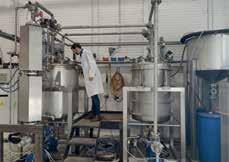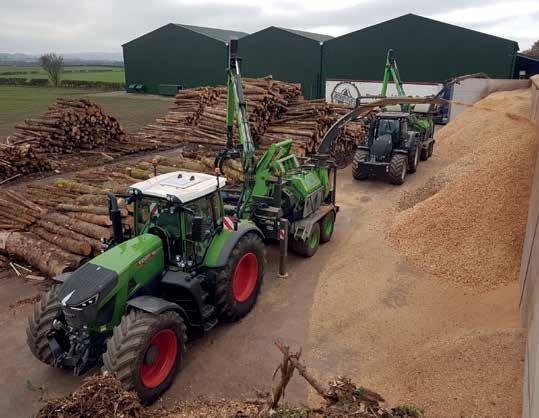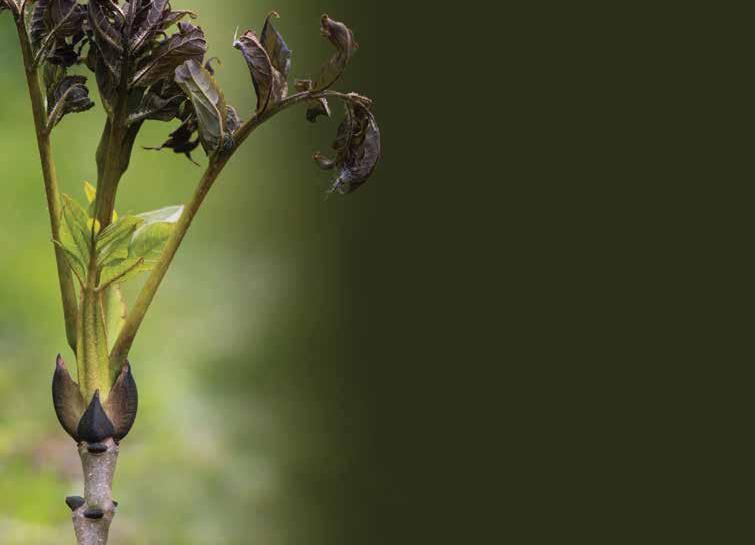
7 minute read
Going Green: Unlocking valuable renewable chemicals from the by-products of forestry
Bio-Sep have developed a clean and green technology to separate woody biomass into renewable chemicals. Miranda Lindsay-Fynn takes a look at the drivers of the bioeconomy and how forestry waste products could contribute to the decarbonization of the UK chemicals industry.
As the world gasps from recent extreme weather events, all eyes are on the outcomes of the COP26 as we look to our leaders to work towards resolutions to solve this climate emergency.
We all have to ask ourselves - what we can do to change our carbon intense economy into an efficient, environmentally friendly one, where nature is protected, and societal needs are addressed? The circular economy and bioeconomy together provide valuable tools to combat climate change and protect nature.
Developments in the bioeconomy
recycle and repurpose waste, whilst the bioeconomy replaces unsustainable fossil resources with biochemicals from plant biomass. Combine the two and we can reduce reliance on fossil fuels by producing renewable carbon chemicals from efficient use of biomass waste streams.
The global biochemical market is growing at over 10% per year. Driven by market pulls and pressure from the increasingly environmentally aware consumer, governments cracking down on single use plastics and shareholder pressure on corporations to follow their ESG agenda meaning chemicals companies are investing billions to eliminate fossil fuels from everyday household and personal care products.
Most new biorefineries use food grade crops, such as maize and sugar cane, which are soft and relatively easy to process, but this takes valuable resources

including arable land and water from the global food chain. Forecasts expect that 14% of maize produced globally will be used in biochemical production by 2028.
A novel technology transforming wood waste into high value biochemicals
Bio-Sep have developed a low energy, sustainable biorefining technology that transforms woody biomass, the by-products of forestry and agriculture into high value biochemicals with a wide range of applications.
These biochemical products sourced from low value by-products and waste streams with no land use change will significantly contribute to meeting sustainability targets, while allowing the UK chemicals industry to meet the growing consumer demand for bio-sourced products.
We take sawdust, mix it with water and organic acids to make a slurry and our patented ultrasonic reactor creates powerful physical forces and chemical reactions that break the connections of the three core components of wood. The products from our process are a sugar syrup, cellulose, and natural lignin which is a complex aromatic molecule.
Exploring the performance properties of wood sourced biochemicals
These biochemicals will be purchased and processed by chemicals companies into end consumer products. They can be used to replace petroleum in multiple applications such as bioplastics, resins, cosmetics, food, and pharmaceuticals.
What is particularly exciting is discovering that these biochemicals have unique performance properties which come from their natural role in the tree itself.
For example, lignin is the substance that gives plants and trees their structural integrity and strength. It is nature’s binding material, the glue that holds the wood together. It also is water repellent, has innate UV-shielding properties, antibacterial properties, and heat resistance.
Lignin is the only natural biochemical that can replace a toxic petrochemical called phenol commonly used in resins, coatings, plastics, and adhesives. Lignin as an eco-substitute not only reduces the carbon footprint and toxicity for the manufacturers but also provides these valuable performance benefits such as fire resistance and UV protection. As the second biggest renewable source of renewable carbon after cellulose it holds huge potential as a future chemical of the bioeconomy.
Lignin is more than just a material it also has applications in fragrances and flavourings as it is natures source of vanilla, which is found as vanillin in lignin. The reason your favourite wines and whiskies are aged in oak barrels is to absorb some vanilla flavouring from the lignin in the oak.
QA&
Miranda Lyndsay-Fynn in an interview with Stef Kaiser
QCan you say anything about the process’ overall carbon and environmental footprint, taking into account any energy or chemicals required for the biorefining?
The environmental and carbon footprint of the process is very important to us as a renewal technology company. When we designed and developed the process, key considerations were low energy usage and use of gentle organic acids which make the process environmentally sound, cost effective and simple to operate. A recent carbon analysis showed our products to be carbon neutral or negative, but the overall carbon impact does depend on other factors such as the energy source and transport of the feedstock, which will be important factors when we plan and build our commercial biorefineries.
QWhat is your current state of production and how are you looking to work with the forestry – and therefore feedstock supplying - sector in the UK?
We have a pilot demonstration plant based in Melton Mowbray and are preparing to scale the technology with target for the first commercial biorefinery to be operational in 2023. We are keen to work with forestry producers or sawmills either in partnership for joint venture biorefineries or as licensees of the technology. As feedstock producers they could be supplied with a highly automated biorefinery that requires from them just feedstock, water (which is recycled) and electricity. We are happy to talk with and demonstrate the technology to any interested parties.
QFuture-proofing feedstock supply for the bioeconomy: How much of actually available ‘wood waste’ do we have in the UK, and how much demand for bioeconomy products can this feedstock meet? What if overall demand for bioeconomy feedstock will increase exponentially in future, as a major shift away from fossil-based materials happens – where will the feedstock come from?
There were 10m tonnes of softwood roundwood reported as being harvested in 2020 in the UK generating 3.9m tonnes of by-product (sawdust and wood chips) that could be valorised by a biorefinery process. This barely scratches the surface in terms of the bioeconomy demands. There are many other alternative woody biomass feedstocks including certain grasses, corn stovers, bagasse from sugar cane processing, and palm frond waste from palm oil operation in most cases up to 50% of the plant grown is considered waste or low value woody biomass.
QDoes using biomass / ‘waste wood’ for biochemicals have a better overall carbon footprint compared to using them for heat generation? Do you have figures on this?
It does depend on how the chemicals are extracted, and what they are used for. Using biomass for heat generation does release some carbon back into the environment whereas the advantage with bio-based materials applications is that they are a carbon sink.
By implementing efficient biorefinery processes such as BioSeps, forestry companies in the UK can also become part of the bioeconomy and take advantage of a substantial commercial opportunity to valorise these low-value residues through the production of sustainable platform chemicals for the chemicals industry.
Contact To find out more please get in touch Miranda Lindsay-Fynn; Miranda@ bio-sep.com


Biomass Biomass Biomass
Wood Chippers
Wood ChippersWood ChippersCrane Mounts
Crane MountsCrane Mounts Tractor Guarding
Firewood Processors
Forestry WinchesForestry Winches Portable Sawmills Firewood ProcessorsFirewood Processors Grapple Saws
Portable SawmillsPortable SawmillsTree Shears
Grapple SawsGrapple SawsCone Splitters
Sawdust Extractors
Tree ShearsTree Shears Woodchip Blowers Cone SplittersCone SplittersTimber Trailers Sawdust ExtractorsSawdust ExtractorsForestry Cranes Woodchip BlowersWoodchip BlowersLog Splitters
Timber TrailersTimber TrailersWood Saws Billet Bundlers
Forestry CranesForestry CranesAnd Much More
Log SplittersLog Splitters
Wood SawsWood Saws Billet BundlersBillet Bundlers
And Much MoreAnd Much More
www.fuelwood.co.uk
www.fuelwood.co.uk 01926 484673 01926 484673 sales@fuelwood.co.uk sales@fuelwood.co.uk Beausale : Warwick : CV35 7AFSales Service SupportBeausale : Warwick : CV35 7AFSales Service Support Sales Service Support
Euroforest A5 landscape Ash Ad.qxp_Layout 1 13/03/2019 09:20 Page 1
Managing Ash Dieback

■ Ash Die Back (Chalara) is now present throughout the UK. ■ Sadly expectation is for up to 97% loss of ash trees. ■ Ash is widespread in woodlands and roadside edges. ■ Are you managing your liability, particulalrly in respect of falling trees around footpaths and highways? ■ Secondary factors, such as honey fungus, can cause rapid decay. Decide NOW, before the timber value tumbles, or the removal of increasingly unstable trees becomes more dangerous and costly. Using specialised, cost-effective machinery and expert teams, supported by professional management, Euroforest will turn your dying woodland into a sustainable asset.

sustainable excellence

For further info visit www.euroforest.co.uk and speak to your local Area Manager, or simply call 01228 217517.










